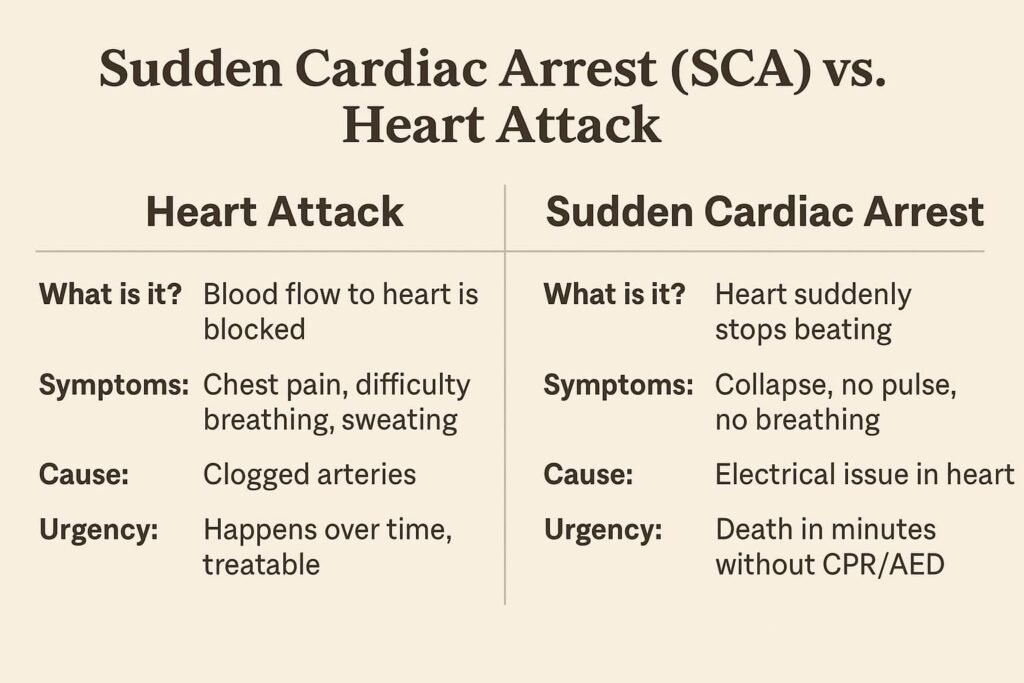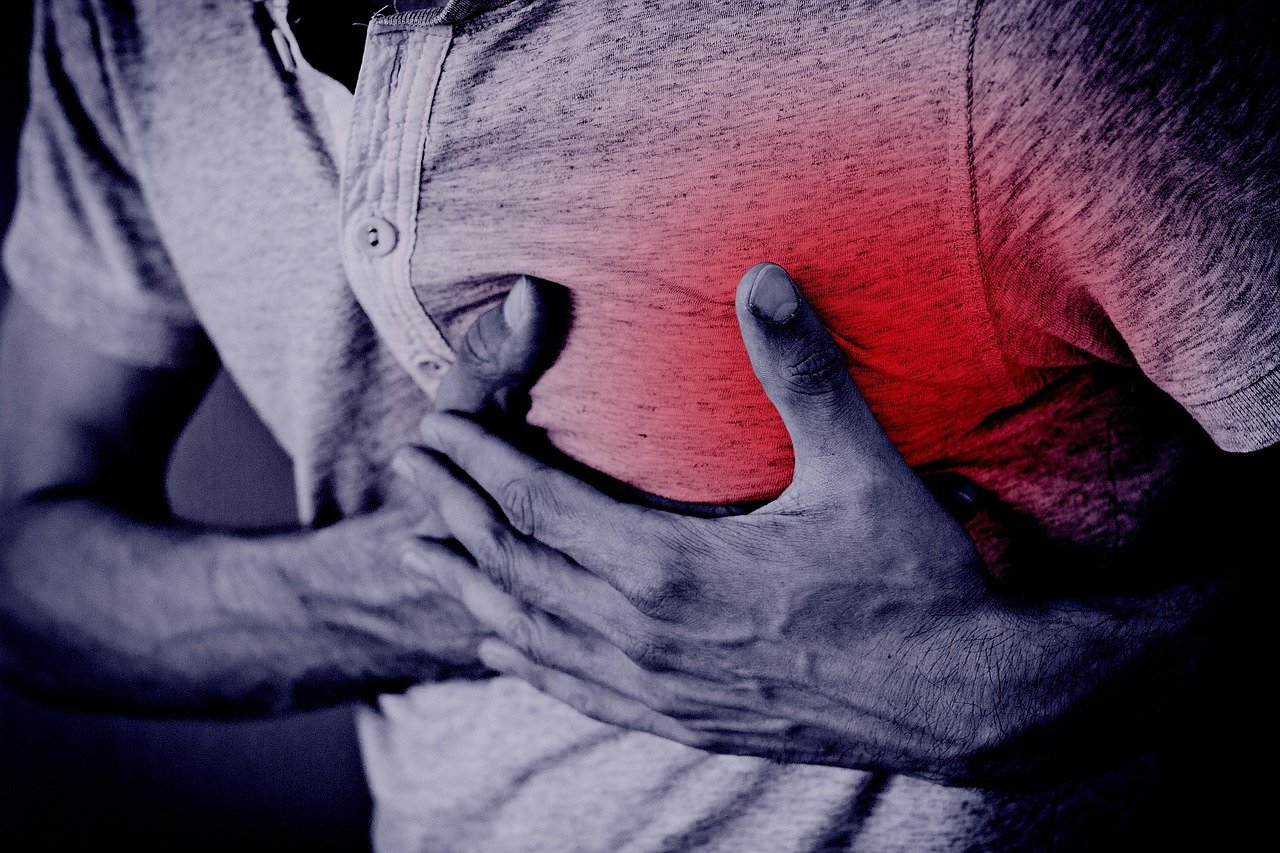Why Are So Many People Dying of Sudden Heart Attacks? The Hidden Dangers

In recent months numerous people, even young, healthy people, have died suddenly from heart attacks. Athletes collapsing on the field to everyday men and women dying in their sleep, the incidence of these sudden cardiac deaths is grim. But why is this happening?
What Is a Sudden Cardiac Arrest?
A heart attack, also known as a myocardial infarction, happens when blood can’t reach a part of your heart because something—often a blood clot—is blocking the way. Without that blood flow, the affected part of your heart doesn’t get the oxygen it needs, which can cause serious damage if not treated quickly. If that flow of blood is not quickly restored, the lack of oxygen can damage or permanently destroy the heart muscle — in some cases leading to sudden death.
But sudden cardiac arrest (SCA) is much more deadly. It occurs when the heart abruptly stops beating as a result of an electrical malfunction. Unlike heart attacks, SCA can lead to death within minutes if not treated right away.
(Why Are So Many People Dying of Sudden Heart Attacks?)
⚠️ What Explains the Sharp Increase?
1. Uncontrolled Stress
Chronic stress contributes to inflammation, high blood pressure and hormonal imbalance — all of which take a direct toll on the heart.
2. Lack of Physical Activity
(ISTOCKPHOTO) In recent times, sedentary living has sky-rocketed, particularly following the COVID-19 lockdowns leading to higher levels of being overweight and lower levels of cardiovascular fitness.
3. Poor Diet

All that consumption of unhealthy ultra-processed foods, trans fats and sugar is contributing to clogged arteries, even in young people.
4. Undiagnosed Medical Conditions
Many people live with:
- High blood pressure
- High cholesterol
Diabetes…without ever getting tested. Those silently damage the heart over years.
5. Excessive Stimulants or Supplements
Uncontrolled energy drinks, pre-workouts, or muscle building options can dangerously raise heart rate and blood pressure.
6. Post-Viral Inflammation (e.g., COVID-19)
The disease can also cause inflammation even in the heart of people who only experience a mild version of the infection, increasing the risk of heart failure and sudden arrest.
(Why Are So Many People Dying of Sudden Heart Attacks?)
Who Is Most at Risk?
- Men over 40
- Smokers
- Those with heart disease in the family
- Chronic stressors and anxiety-prone individuals
- Sedentary workers (e.g. desk jobs)
- Obese individuals
- People who ignore regular check-ups
Even elite athletes are not immune to overexertion and electrolyte imbalance, however.
(Why Are So Many People Dying of Sudden Heart Attacks?)
Protect Yourself From A heart Attack
Here are some evidence-based strategies for reducing your risk:
✅ 1. Get Regular Heart Screenings
Check your:
- Blood pressure
- Cholesterol
- Blood sugar
- ECG or Echo (if needed)
✅ 2. Exercise 4–5 Times a Week
Even half an hour of walking makes a difference. Don’t start doing heavy exercises without warming up.
✅ 3. Eat Heart-Healthy Foods

Add:
- Oats
- Fruits & veggies
- Omega-3 (fish, chia seeds)
- Nuts & olive oil
Avoid:
- Fried items
- Red meat
- Sugary drinks
- White bread
✅ 4. Reduce Stress
Practice:
- Meditation
- Deep breathing
- Journaling
- Talking to loved ones
✅ 5. Avoid Smoking & Limit Alcohol

The top causes of blocked arteries include smoking. Quit — your heart says, Thank you.
✅ 6. Watch Your Weight and Sleep
But two of the biggest hidden culprits are obesity and sleep apnea. Avoid smoking; maintain 7–8 hours of restorative sleep.
✅ 7. Listen to Your Body
Don’t ignore:
- Chest discomfort
- Fatigue
- Shortness of breath
- Jaw or back pain
- Lightheadedness
If you experience these warning signs, ask for emergency assistance — even if they seem “mild”.
(Why Are So Many People Dying of Sudden Heart Attacks?)
Final Thoughts
“Heart attacks are not an ‘old person’s’ problem anymore.” Now, 25-year-olds are dying of this silent killer. But the great news is: Heart attacks can be largely prevented.
You can reduce your risk significantly by changing to a healthier lifestyle, getting screened and knowing your body.
(Why Are So Many People Dying of Sudden Heart Attacks?)
FAQ
A1: Can young and healthy people actually get heart attacks suddenly?
Yes. Unfortunately, increasingly, young people — even those who appear to be fit — are being felled by sudden heart attacks. It’s easy to forget about silent problems, stress, undiagnosed issues, poor diet, until it’s too late.
Q2: What’s the difference between a heart attack and sudden cardiac arrest (SCA)?
A heart attack can happen when your arteries become blocked, cutting off blood flow to your heart. On the other hand, sudden cardiac arrest (SCA) is when your heart unexpectedly stops beating altogether, often without any warning. SCA is especially dangerous and life-threatening, and it usually comes on suddenly, without giving you any time to prepare.
Q3: To what do you attribute the higher incidence of heart attacks nowadays?
Lifestyle has changed. We sit more, sleep less, eat worse, and live under greater chronic stress. Heap on top of that substandard tests to check the heart and post-COVID inflammation, and the calculus changes a lot.
Q4: What are the early warning signs of a heart problem I should never ignore?
Watch out for:
- Chest discomfort (even mild)
- Shortness of breath
- Sudden fatigue
- Dizziness or light-headedness
- Pain in jaw, neck, or back
If your body whispers, that don’t scream.
Q5: What can I do to ensure that I’m not hit with a sudden heart attack (like John Ritter, my dad or my dad’s dad)? Start small:
- Walk daily
- Eat not junk but real food
- Get checkups (blood pressure, sugar, cholesterol)
- Maintain low stress levels, through mindfulness, prayer, or rest.
- And most of all — listen to your body.
Q6: Is there any role of emotional stress or anxiety in causing a heart attack?
Absolutely. Chronic stress raises cortisol and blood pressure, keeping your heart in overdrive. Emotional suffering can take its toll on the body — particularly the heart.
Q7: I’m scared — should I get tested, even if I feel perfectly normal?
Yes. An exam can be a very, very good preventative — in the literal sense, lifesaving — medicine. How you “feel fine” isn’t how your heart feels. Better safe than sorry.
End Note:
Heart disease no longer discriminates by age. But armed with awareness, early action and care — we can protect ourselves and the ones we love.
Samsung Galaxy Z Fold 7 – The Thinnest & Smartest Foldable Phone of 2025
- Xiaomi Mix Flip 2 Review – A Creaseless Masterpiece with Leica Power?
- WWIII Trends Globally as Gen Z Responds to Iran-Israel Escalation With Dark Memes
- Putin Credited Trump for the Improvement in Russia-US Relations
- Top 10 Fruits That Help You Gain Weight Fast and Naturally

